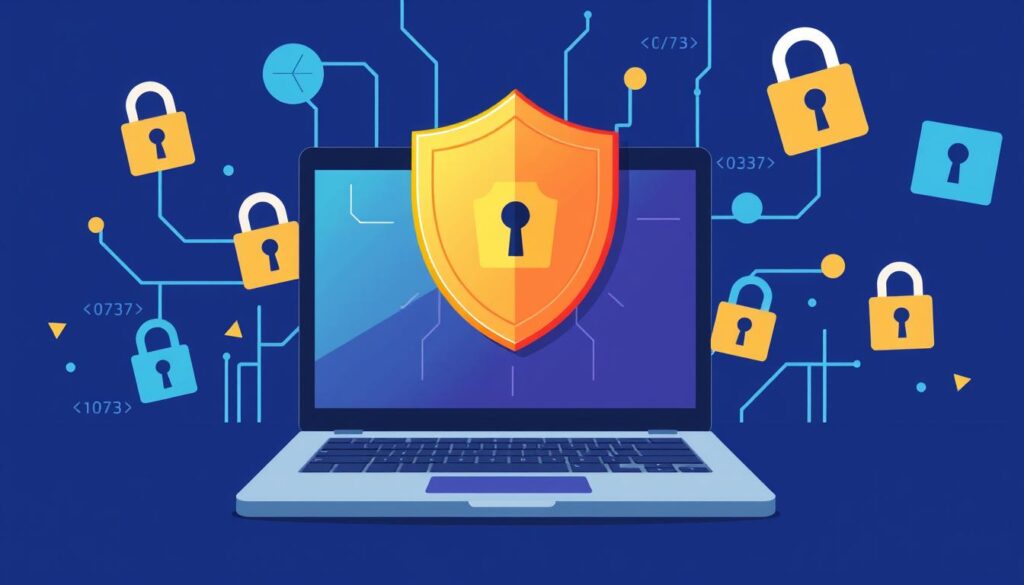In today’s digital landscape, cybersecurity is more critical than ever. With the rise of sophisticated cyber threats, organizations are at risk of losing their valuable data and compromising their security. As a result, the demand for skilled cybersecurity analysts has skyrocketed.
You play a key role in protecting your organization’s data as a cybersecurity analyst. Your responsibilities include anticipating and defending against cyber threats, and responding to security breaches when they happen. This comprehensive guide will explore the evolving role of cybersecurity analysts in 2024, detailing their critical responsibilities in protecting organizational assets.
Key Takeaways
- Cybersecurity analysts serve as frontline defenders against cyber threats.
- The role involves monitoring network traffic and investigating security incidents.
- Implementing security protocols is crucial to safeguarding sensitive data.
- Cybersecurity is a business-critical function that helps organizations maintain operations and reputation.
- The demand for skilled cybersecurity analysts is on the rise due to increasing cyber threats.
The Role of a Cybersecurity Analyst in 2024
In the ever-changing digital world, the role of a cybersecurity analyst is becoming increasingly crucial. As technology advances, the threat landscape is expanding, and organizations need skilled professionals to protect their digital assets.
A cybersecurity analyst is responsible for ensuring the security of an organization’s computer systems and networks. This involves a range of tasks, from monitoring for potential threats to implementing measures to prevent cyber attacks.
Core Responsibilities and Daily Tasks
The daily tasks of a cybersecurity analyst can vary depending on the organization and the specific role. However, some common responsibilities include:
- Monitoring network traffic for signs of unauthorized access or malicious activity
- Conducting risk assessments to identify potential vulnerabilities
- Implementing security measures to protect against cyber threats
- Responding to security incidents, such as data breaches or malware outbreaks
Cybersecurity Analyst vs. Information Security Analyst
While the terms cybersecurity and information security are often used interchangeably, there are some key differences between the two. Information security is a broader term that encompasses the protection of all forms of information, regardless of format. This includes physical documents, verbal communications, and digital data.
Cybersecurity, on the other hand, specifically focuses on the protection of digital data and systems. A cybersecurity analyst is responsible for protecting data stored on computers, hard drives, or the internet. In contrast, an information security analyst takes a more holistic approach, considering the security of data in all its forms, including physical documents and insider knowledge.
Understanding the distinction between these two roles can help you navigate job descriptions and career paths in the security field, allowing you to align your skills and interests with the most appropriate specialization.
What Does a Cybersecurity Analyst Do?
In the ever-evolving landscape of cybersecurity, analysts must be adept at handling security incidents and protecting organizational data. Your role as a cybersecurity analyst is crucial in ensuring the security and integrity of an organization’s digital assets.
Monitoring and Detecting Security Threats
Cybersecurity analysts are responsible for continuously monitoring the organization’s network for potential security threats. This involves using various tools and techniques to identify vulnerabilities and detect anomalies that could indicate a security breach. By staying vigilant, you can help prevent attacks before they occur.
Effective monitoring involves analyzing logs, network traffic, and system behavior to identify potential security incidents. This proactive approach enables you to respond quickly to emerging threats and minimize potential damage.
Implementing Security Measures
Implementing robust security measures is a critical aspect of your job as a cybersecurity analyst. This includes configuring firewalls, intrusion detection systems, and encryption technologies to protect sensitive data. You must also ensure that all security software is up-to-date and configured correctly to prevent penetration by malicious actors.
By implementing these measures, you can significantly reduce the risk of a security breach and protect your organization’s data and systems from various security threats.
Responding to Security Incidents
Responding to a security event means acting fast and prioritizing tasks that will shut down the attack or isolate the data breach quickly to minimize damage. As a cybersecurity analyst, you must document the process of investigation and recovery and may be tasked with training fellow employees in best security practices.
- Incident response is a critical function where you must act quickly and methodically to contain, eradicate, and recover from security breaches while minimizing damage to the organization.
- The structured incident response process includes identification, containment, eradication, recovery, and lessons learned phases that guide you through security events.
- Detailed documentation of security incidents is essential for legal purposes, insurance claims, regulatory compliance, and improving future security posture.
- Effective communication is crucial during incidents, with you often serving as the technical liaison between IT teams, management, legal counsel, and external stakeholders.
- Post-incident analysis helps organizations strengthen their security posture by identifying root causes and recommending improvements to prevent similar incidents in the future, thereby reducing vulnerabilities.
By understanding the importance of incident response and implementing effective measures, you can help protect your organization’s data and maintain the trust of your customers and stakeholders.
Essential Skills for Cybersecurity Analysts
The role of a cybersecurity analyst demands a unique combination of technical knowledge and personal attributes. As cyber threats continue to evolve, the skills required to protect an organization’s digital assets become increasingly complex.
Technical Skills and Knowledge
Cybersecurity analysts must have a strong foundation in technical skills, including knowledge of operating systems, network protocols, and security frameworks. They should be proficient in using various security tools and technologies, such as firewalls, intrusion detection systems, and encryption methods.
Staying up-to-date with the latest technologies and threats is crucial. You can enhance your technical skills by pursuing relevant certifications and training programs, such as those offered on cybersecurity education platforms.
Soft Skills and Personal Attributes
Beyond technical expertise, successful cybersecurity analysts must develop strong soft skills that enable them to work effectively within organizations and communicate complex security concepts. Key attributes include:
- Attention to detail: Noticing a small anomaly could mean saving your company from a big data loss.
- Communication: Coordinating with your security team and documenting the process of investigation and recovery.
- Critical thinking: Making data-driven decisions when responding to threats or recommending new security protocols.
- Curiosity: Staying up-to-date on new threats and security best practices.
- Calm under pressure: Acting fast and prioritizing tasks to minimize damage during a security event.
These soft skills are essential for effective teamwork, clear communication with both technical and non-technical stakeholders, and making informed decisions under pressure.
Education and Qualifications
Cybersecurity is a rapidly evolving field, and having the right education and certifications can make a significant difference in your career. As you navigate the various requirements, you’ll find that a combination of formal education and industry-recognized certifications can significantly enhance your job prospects.
Degree Requirements: Is a Bachelor’s Degree Necessary?
The educational pathway to becoming a cybersecurity analyst can vary, but most positions require at least a bachelor’s degree in a relevant field such as computer science, information assurance, or cybersecurity.
While a degree is often a baseline requirement, the specific field of study can be less critical than the skills and knowledge you’ve acquired. Coursework in programming, network security, and data structures can be particularly valuable.
Valuable Certifications for Cybersecurity Analysts
Certifications play a crucial role in validating your cybersecurity skills and knowledge. According to data from Burning Glass Technologies, over half (59 percent) of all cybersecurity positions require at least one certification.
Earning a cybersecurity certification not only enhances your credibility but also demonstrates your commitment to staying updated with the latest security practices.
Some of the most valuable certifications include:
- CompTIA Security+: Provides a broad introduction to security concepts and is often considered an entry point into the field.
- Certified Ethical Hacker (CEH): Demonstrates expertise in identifying vulnerabilities and weaknesses in computer systems.
- Certified Information Systems Security Professional (CISSP): Recognized globally, this certification validates your ability to design and implement secure solutions.
- Certified Information Security Manager (CISM): Focuses on the management aspect of cybersecurity, ideal for those looking to move into leadership roles.
- Vendor-specific certifications from companies like Microsoft, Cisco, and AWS, which demonstrate proficiency with particular technologies.

When choosing certifications, consider your career goals and the specific requirements of your desired role. Strategically planning your certification path can help you stand out in a competitive job market and open up new career opportunities.
Career Outlook for Cybersecurity Analysts
The career outlook for cybersecurity analysts in 2024 is promising, with significant growth opportunities. As technology continues to advance and cybersecurity threats become more sophisticated, the demand for skilled professionals in this field is on the rise.
Job Growth and Market Demand
The job market for cybersecurity analysts is highly competitive, with a strong demand for skilled professionals. According to the Bureau of Labor Statistics (BLS), employment of information security analysts is projected to grow 35% from 2021 to 2031, much faster than the average for all occupations.
This growth is driven by the increasing need for organizations to protect themselves against cyber threats. As technology advances, companies are investing heavily in cybersecurity measures, creating a high demand for skilled analysts.
Salary Expectations in 2024
Cybersecurity analysts can expect competitive salaries, with the median annual pay for information security analysts in the United States being $120,360, according to the BLS. The average annual salary quoted in US job listings for cybersecurity analysts from May 2022 through April 2023 was $107,517, according to CyberSeek.
Several factors influence cybersecurity salaries, including geographic location, industry sector, years of experience, specialized skills, and relevant certifications. For instance, cybersecurity analysts working in major cities or in industries with high security demands tend to earn higher salaries.
To maximize your earning potential, it’s essential to develop in-demand specializations, obtain advanced certifications, and position yourself for leadership roles within security organizations. The persistent skills gap in cybersecurity continues to drive competitive compensation packages, with organizations often offering additional benefits like remote work options, continuing education allowances, and performance bonuses.
Entry-level cybersecurity positions typically offer strong starting salaries, with significant growth potential as you gain experience and specialized expertise. By strategically developing your skills and expertise, you can capitalize on the growing demand for cybersecurity professionals and enjoy a rewarding career with excellent compensation.
How to Become a Cybersecurity Analyst
Launching a career as a cybersecurity analyst requires a strategic approach to gaining practical experience and developing a robust set of skills. As you navigate this career path, understanding the various roles and opportunities available is crucial. Cybersecurity is a field that demands continuous learning and adaptation to new security threats and technologies.
Step-by-Step Career Path
To become a cybersecurity analyst, follow a structured career path that includes acquiring the necessary education, skills, and experience. Start by building a strong foundation in IT and computer systems.
Begin with entry-level positions or internships that provide hands-on experience in the field. As you progress, you’ll develop a deeper understanding of cybersecurity principles and practices.
Building Experience
Gaining practical experience is vital for a successful career in cybersecurity. Internships offer invaluable exposure to real-world security operations and can often lead to full-time employment opportunities.
Entry-level IT positions, such as help desk technician or network analyst, provide foundational experience with the systems and networks you’ll later be responsible for securing.
- Internships provide hands-on experience in cybersecurity.
- Entry-level positions offer foundational knowledge of IT systems.
- Alternative ways to build experience include volunteer work, open-source security projects, and capture-the-flag competitions.
- Building your own home lab for security testing is another effective way to gain practical skills.
Career Advancement Opportunities

As you progress in your cybersecurity career, you’ll have opportunities to move into leadership roles that shape the security posture of your organization. With experience and additional skills, you can transition from technical roles to management positions that oversee security operations and strategy.
Cybersecurity managers are responsible for overseeing an organization’s security infrastructure. As a cybersecurity manager, you’ll be tasked with managing both human and technological resources to ensure that security infrastructure is properly maintained and that security breaches are handled in an efficient and timely manner.
Specialized Cybersecurity Roles
Experienced cybersecurity professionals can move into specialized roles that require deep technical expertise. These roles may include:
- Security Team Lead, where you’ll oversee security operations and develop the next generation of security professionals.
- Security Architect, responsible for designing and implementing secure systems and infrastructure.
- Incident Response Manager, leading teams to respond to and manage security incidents.
These specialized roles allow you to focus on specific areas of cybersecurity and develop expertise that is highly valued in the industry.
Leadership Positions in Cybersecurity
For those who aspire to leadership positions, roles such as Chief Information Security Officer (CISO) offer the opportunity to set security strategy at the highest organizational level and ensure alignment with business objectives. To succeed in these roles, you’ll need to develop additional skills beyond technical expertise, including:
- Strategic planning and budget management.
- Team development and executive communication.
- Business acumen, understanding how to translate technical security concepts into business terms.
Effective security leaders must be able to advocate for security investments by demonstrating their value in protecting organizational assets and enabling business operations. By advancing to these leadership positions, you can make a significant impact on your organization’s security posture and overall success.
As you advance in your cybersecurity career, you’ll have the opportunity to shape the future of your organization’s security strategy and lead teams to achieve their goals. By developing the necessary skills and expertise, you can position yourself for success in these leadership roles.
Day in the Life of a Cybersecurity Analyst

The life of a cybersecurity analyst is dynamic, filled with challenges and opportunities to protect against cyber threats. As a cybersecurity professional, you play a crucial role in safeguarding your organization’s digital assets and sensitive data.
Work Environment and Schedule
Cybersecurity analysts typically work in a fast-paced environment, often within an organization’s IT department or as part of a dedicated cybersecurity team. The work schedule can vary, but many analysts work full-time, with some organizations requiring evening or weekend shifts to ensure continuous monitoring of security systems.
The work environment is often a mix of office work and remote monitoring, allowing for flexibility. However, the nature of the job means being on call to respond to threats and vulnerabilities at any time.
Common Challenges and Rewards
Being a cybersecurity analyst comes with its set of challenges and rewards. Some of the common challenges include:
- Alert fatigue from constant security notifications
- The pressure of responding to incidents under tight time constraints
- The need to continuously learn new technologies and threat techniques
Despite these challenges, the role offers significant intellectual rewards, including:
- The satisfaction of solving complex security puzzles
- Constant learning opportunities to stay ahead of emerging threats
- The knowledge that your work directly protects valuable assets and information
Cybersecurity professionals often describe their work as meaningful and impactful, knowing they’re defending their organization against threats that could cause significant harm. The cybersecurity community itself offers rewards through collaboration, knowledge sharing, and a strong sense of professional identity among those working to protect digital assets from malicious actors.
In conclusion, a career as a cybersecurity analyst is both challenging and rewarding. It offers the opportunity to make a real difference in protecting data and security systems, making it a fulfilling career choice for those passionate about cybersecurity.
Coursera’s Cybersecurity Programs

If you’re looking to start or advance your career in cybersecurity, Coursera offers a range of programs to help you achieve your goals. Coursera’s cybersecurity education is designed to be comprehensive, covering both theoretical knowledge and practical skills.
Coursera partners with industry leaders like Google, IBM, and Microsoft to offer Professional Certificates that provide job-ready skills and prepare you for in-demand cybersecurity roles without requiring previous experience. For instance, the Microsoft Cybersecurity Analyst Professional Certificate is designed to prepare you for Microsoft’s SC-900 exam and a first job in cybersecurity, all at your own pace.
Google’s Cybersecurity Professional Certificate teaches you how to protect networks, devices, people, and data from unauthorized access and cyberattacks using Security Information and Event Management (SIEM) tools. You’ll also gain hands-on experience with Python, Linux, and SQL, enhancing your technical skills.
Coursera’s courses are designed with input from industry experts to ensure the curriculum aligns with current employer needs, preparing you for real-world cybersecurity challenges. The flexible, self-paced learning format allows you to develop cybersecurity skills while balancing other work and life commitments, making career transitions more accessible.
By enrolling in Coursera’s cybersecurity programs, you’re investing in a degree or certification that can significantly boost your career prospects in this rapidly evolving field.
Conclusion
With technology advancing at a rapid pace, the demand for skilled cybersecurity analysts continues to grow. As data and digital technologies become more integral to businesses worldwide, the role of cybersecurity professionals in protecting these assets from threats becomes increasingly vital.
You now understand the critical responsibilities of a cybersecurity analyst, from monitoring and detecting security threats to implementing robust security measures and responding to incidents. The field offers diverse career paths, allowing you to specialize based on your interests and strengths, whether in information security or other cybersecurity roles.
To embark on or advance your career in this field, you can leverage various educational pathways, including degrees, certifications, or skills-based training programs. Developing the right mix of technical skills and soft skills is crucial for success.
As you move forward, consider the exceptional growth prospects and the meaningful work that a career in cybersecurity offers. Whether you’re starting your education, applying for entry-level positions, or advancing your existing career through specialization or leadership roles, the opportunities in this field are vast and rewarding.
